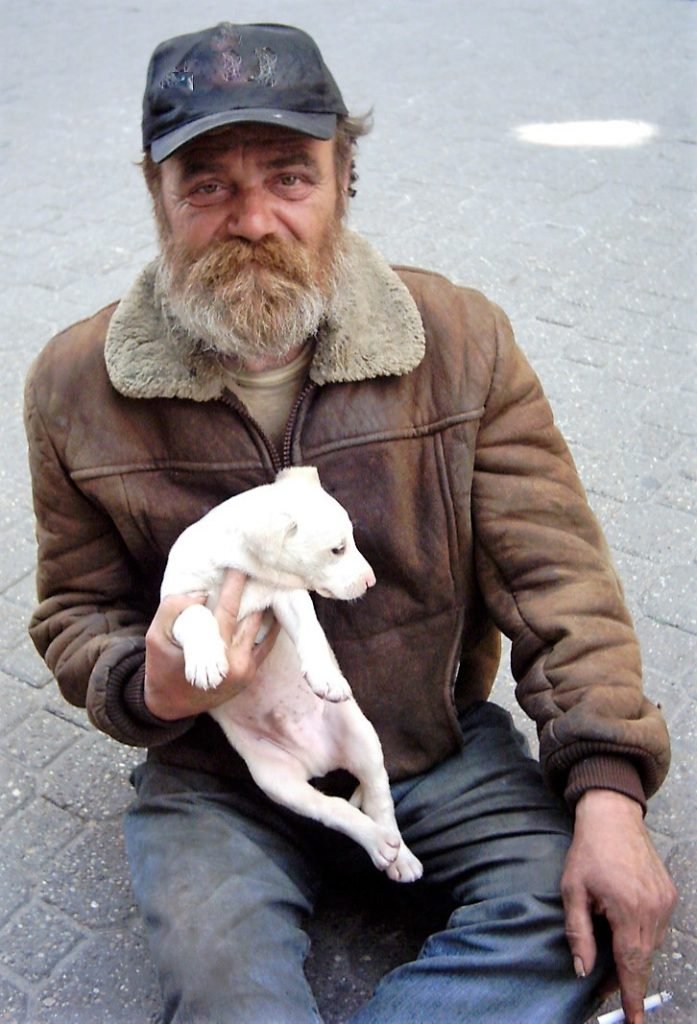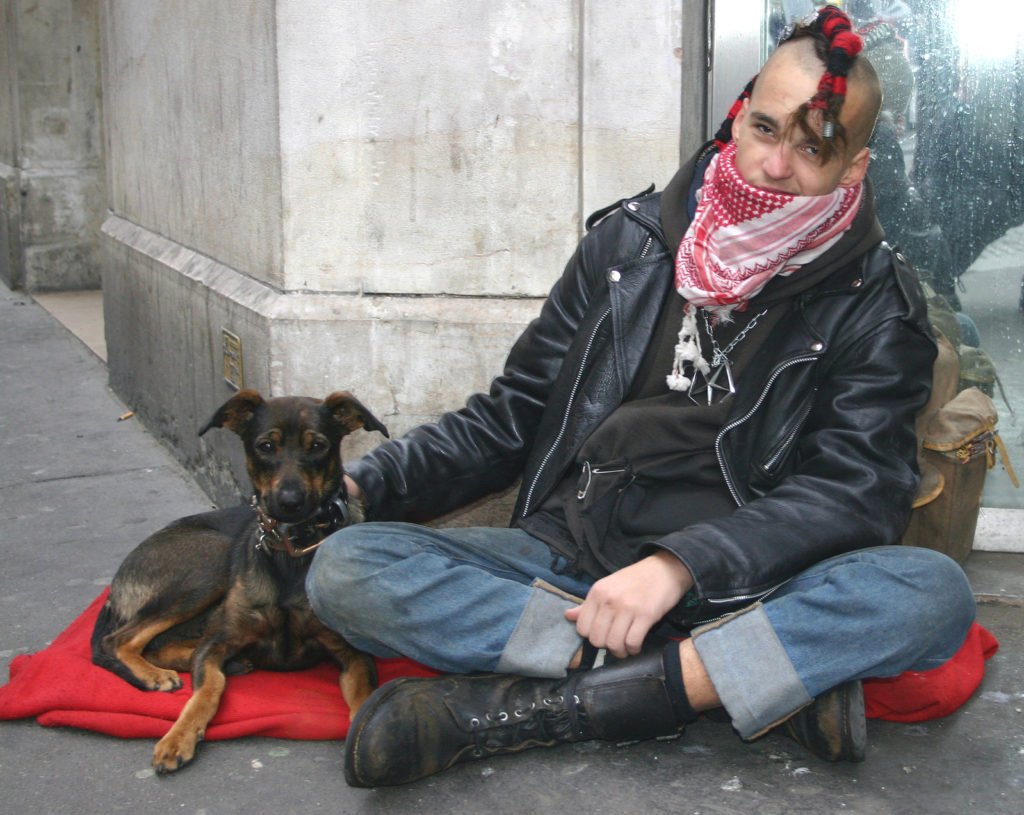Most street pets lead uncertain lives despite all the hype.
The plight of homeless people on our streets is topical and the UK Government is to introduce new plans to tackle the problem which is much-needed and long overdue. Often though, wherever there is a person living rough on the street there will also be a “faithful dog” or even cat by their side. A few years back there was a popular book and film about Bob the ginger cat living with, and apparently ‘saving’ his homeless owner, which has made the scenario of a homeless person huddled in a doorway with a dog or cat lying beside them as a mostly acceptable and beneficial situation, but is it?
Street pets have been romanticised
It doesn’t necessarily follow that it is essential for the survival of a homeless person to have a pet despite some charities insisting it gives many the critical companionship and a lifeline which they apparently cannot live without. Street pets have been somewhat romanticised and it has detracted from the reality that most lead uncertain lives despite all the hype from many animal loving charities that their owners care for them or that the dog enjoys the experience.

Most dogs I have observed appear dejected, bored and neglected of any stimulus and I have rarely see one that looks happy with its life. If they are so loved and cared for why on earth is so much fund-raising taking place and effort being put into caring for them.
“People think the homeless shouldn’t have animals, but a lot of the time they really love their pets and look after them as a result”
All the major dog charities have jumped in with services to help the animals and on the back of it receive good caring publicity. The Blue Cross support Street Vets, the Dogs Trust have their Hope project, the PDSA have a project to help and RSPCA Inspectors give help on the street as well. Recently there has been several private charities established to come to the aid of “homeless persons’ £ pets”. Animal charities are raising large sums to offer neutering and vaccination schemes, drop-in basic care centres, mobile vet surgeries, temporary fostering and street visits, but it seems a little over the top and are the homeless humans and the charities involved getting more from this than the animals?
RSPCA Inspectors patrol and check on animals owned by the homeless, handing out leaflets of veterinary charities that will freely neuter, vaccinate, microchip and treat them and handing out leads, collars, bowls, coats and food, and one Inspector has said: ‘People think the homeless shouldn’t have animals, but a lot of the time they really love their pets and look after them as a result’. It begs the question that if they do look after them so well, why all the free handouts to make sure they are adequately cared for?
The emphasis is always on the alleged benefit to the person and not what might be the needs and best interests of the animals.
Of course, many will say what about the benefit to the homeless person of companionship, of warding off loneliness and having a friend to talk to and be responsible for, but realistically the benefit is only going one way. These are not feral dogs and cats which are able to fend for themselves but are captive and totally reliant on their conceivably unreliable keeper. They have no say in the matter and given the choice I am sure most dogs would prefer and be curled up in a nice warm and safe environment with someone able to provide for all their needs.
Are charities missing the point?
Although the work of these charities is laudable in their intent they cannot cater for everyone in this situation and because of the owners’ lifestyle of vagrancy, cannot continually monitor an individual animal’s welfare. The charity Street Vet are only able to seek out people living rough with their dogs in London, Bristol, Brighton Plymouth and Cambridge. For this reason they want more donations to put “more vets on the streets helping more people and dogs in need” and the ability to offer more care and support for “homeless dogs who may otherwise have to go without the care they need and deserve.” They also state on their website that “veterinary care is difficult to find and impossible to afford.” These statements only seem to indicate that the dogs are being neglected and that the owners are unable to fulfill their legal duty of care.

Difficulties arise when either the ‘owner’ or the animal falls ill or gets injured as some rough sleepers are alcoholics, addicts, have mental health issues or general ill-health through their lifestyles often triggering hospital, hostel or prison stays which result in the dogs being discarded and even leading to them being caused harm. Charities are now providing temporary fostering or boarding for them like the charity Dogs on the Street (DOTS) whose website states that “everybody human or canine deserves a roof over their heads”, but if this is so why do we allow these dogs to stay on the streets.
“To a homeless dog-owner their dog is their world. They often put the needs of the dog before their own. I don’t know how many times I’ve heard someone say it’s not a case of them rescuing the dog, but the dog rescuing them” Michelle Clark, founder, DOTS
Again, this is all very noble, but making a dog live on the streets is not “rescuing” it and there is no reason to put the needs of a dog before their own, but better to concentrate on getting their own lives sorted before acquiring a dog.
Looking at the problem logically.
Under the Animal Welfare Act 2006 the owner or person in charge of an animal, whether temporarily or permanently, has a legal duty of care to that animal. Government guidelines state that a dog must be provided with:
- Regular opportunity for exercise and to play with people and other dogs to stay fit, healthy and stimulated;
- a safe, clean, quiet environment with protection from hazards;
- a comfortable, clean, dry, quiet draught free rest area and an area where it can rest undisturbed when it wants to;
- A place to avoid things that might frighten or distress it;
- somewhere suitable as a toilet area;
- a comfortable area to relax large enough for comfort, to move around and avoid becoming too hot or cold;
- Not left unattended in a situation that is unsafe;
- access to safe toys and objects to chew and to make sure there is enough stimulus so that the dog is not distressed or bored;
- a well-balanced diet to stay fit and healthy.
With the best will in the world, a dog living rough with a homeless person, regardless of whether supported on occasions by charity, cannot give such conditions and it is hardly a safe environment for the person not alone the dog. By their own admission, they are often assaulted or disturbed by incinsiderate passersby.

Domesticated dogs have supposedly had their ‘natural’ rough living bred out of them over centuries, becoming accustomed to certain home comforts as befitting their role as family pets and companions.We have all watched animal rescue TV documentaries depicting ill-treated and neglected dogs found new homes with loving families, charging around tails wagging and sleeping in front of the fire or on the couch and on the owners’ bed at night. This is the perfect picture in most people’s minds of a pet leading a good life, but at the same time we appear unconcerned about those nestled by the side of homeless people.
Arguably causing unnecessary suffering
Many of the dogs on the streets are elderly and suffer from conditions such as arthritis, diabetes, kidney disease and cancer which need ongoing monitored treatment and regular provision and administration of drugs. Many of these conditions are worsened from lack of exercise, poor diet and cold, wet and damp conditions. In very cold weather coughs, colds and even hypothermia are risks they can also face.
We can argue that the homeless person suffers in the same way, but the difference is that owning a dog in these circumstances is realistically unnecessary for the survival of the homeless person, often a worry and stressful for both owner and dog and all to fulfill an unproven state of well-being for the human involved. Looked at logically, any other person treating or keeping a dog in similar fashion would be accused of causing unnecessary suffering.
Surely we should be reducing the number of animals forced to live under these circumstances and not encouraging their use in this way. The best answer of course is to get the homeless off the street.
